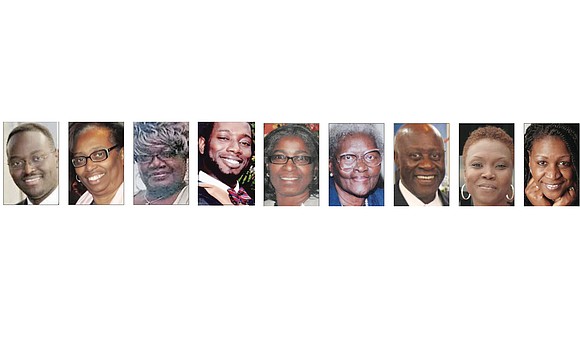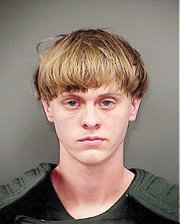Jury sentences white supremacist to death in S.C. church massacre
Free Press wire reports | 1/13/2017, 5:46 p.m.
CHARLESTON, S.C.
Unrepentant white supremacist Dylann Roof was sentenced to death Tuesday for fatally shooting nine African-American church members during Bible study at a landmark Charleston, S.C., church, becoming the first person ordered executed for a federal hate crime.
A jury deliberated for about three hours before returning with the decision, capping a trial in which the 22-year-old avowed white supremacist did not fight for his life or show any remorse.
He served as his own attorney during sentencing and never asked for forgiveness or mercy or explained the massacre.
Hours earlier, Mr. Roof threw away one last chance to plead for his life, telling jurors, “I still feel like I had to do it.”
The slain included the Rev. Clementa Pinckney, the church pastor and a state senator, as well as other pillars of the community: A high school track coach, the church sexton, a librarian and an aspiring poet. They all shared deep devotion to the church, Emanuel African Methodist Episcopal Church, known as Mother Emanuel, and passed that faith along to their families, many of whom offered Mr. Roof forgiveness when he appeared in court just days after the attack.
As Mr. Roof spoke during the court hearing Tuesday for about five minutes, every juror looked directly at him. A few nodded as he reminded them that they said during jury selection they could fairly weigh the factors of his case. Only one of them, he noted, had to disagree to spare him from a lethal injection.
“I have the right to ask you to give me a life sentence, but I’m not sure what good it would do anyway,” he said.
When the verdict was read, he stood stoic. Several family members of victims wiped away quiet tears.
Mr. Roof told FBI agents when they arrested him after the June 17, 2015, slayings that he wanted the shootings to bring back segregation or perhaps start a race war.
Instead, the slayings had a unifying effect, as South Carolina removed the Confederate flag from its Statehouse for the first time in more than 50 years. Other states followed suit, taking down Confederate banners and monuments. Mr. Roof had posed with the Confederate battle flag in photos.
Malcolm Graham, whose sister Cynthia Hurd was slain, said the jury made the right decision.
“There is no room in America’s smallest jail cell for hatred, racism and discrimination,” he said from his home in Charlotte, N.C. “The journey for me and my family today has come to an end.”
One of Ms. Hurd’s other brothers, Melvin Graham, said the jury’s decision “was a very hollow victory” because his sister is still gone.
“He decided the day, the hour and minute my sister was going to die. Now someone is going to do it for him,” he said.
The jury convicted Mr. Roof last month of all 33 federal charges he faced, including hate crimes. He never explained his actions to jurors, saying only that “anyone who hates anything in their mind has a good reason for it.”
He insisted that he was not mentally ill and did not call any witnesses or present any evidence.
In one of his journals, he wrote that he did not believe in psychology, calling it “a Jewish invention” that “does nothing but invent diseases and tell people they have problems when they don’t.”
His attorneys said he did not want to present any evidence that might embarrass him or his family.
After he was sentenced, Mr. Roof asked a judge to appoint him new attorneys, but the judge said he was not inclined to do so because they had performed “admirably.”
Mr. Roof, who was to be formally sentenced by a judge during a hearing Wednesday, also faces the death penalty if convicted of murder charges in a pending state trial.
Whether he was competent to serve as his own attorney will be a fundamental issue in the appeals process, Robert Dunham, executive director of the Washington-based nonprofit Death Penalty Information Center, said in a telephone interview.
Mr. Dunham said defense lawyers likely will use the trial to show appellate judges that mental illness prevented him from adequately representing himself.
“We are sorry that, despite our best efforts, the legal proceedings have shed so little light on the reasons for this tragedy,” said Mr. Roof’s lawyers, who represented him for the guilt phase.
Mr. Roof sat for 40 minutes with parishioners gathered for Bible study before opening fire as they closed their eyes to pray, Assistant U.S. Attorney Jay Richardson said in his final statement to jurors.
Mr. Roof pulled the trigger 75 times as he methodically killed Rev. Pinckney, 41; Ms. Hurd, 54; DePayne Middleton Doctor, 49; Sharonda Coleman-Singleton, 45; Susie Jackson, 87; Ethel Lance, 70; Myra Thompson, 59; Daniel Simmons Sr., 74; and Tywanza Sanders, 26.
Three people survived the attack.
Jurors heard four days of heart-rending testimony from more than 20 of the victims’ loved ones, who described their legacies of faith and the devastation wrought by Mr. Roof’s brutality.
“What’s wrong here is the calculated racism, the choice to target a church, particularly the people in a church,” Mr. Richardson told jurors. “What’s wrong here is precisely why this is a case that justifies the death penalty.”
The last person sent to federal death row was Boston Marathon bomber Dzhokhar Tsarnaev in 2015.









